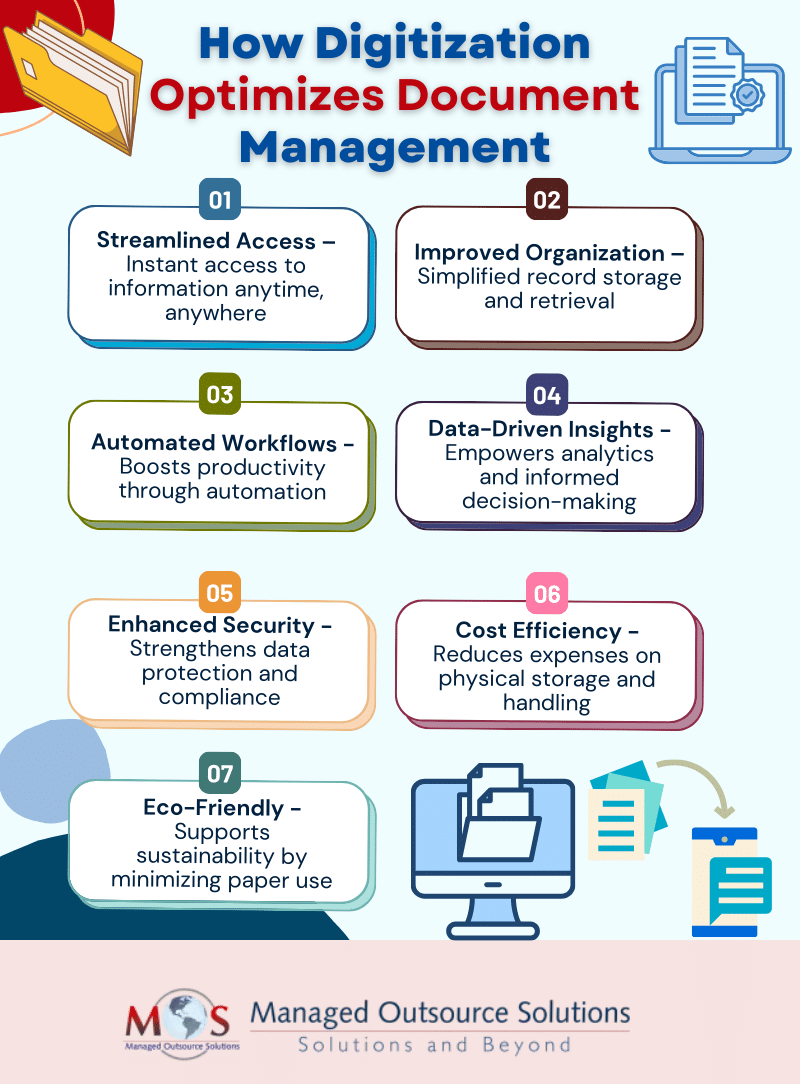Document management involves the systematic process of capturing, organizing, storing, and retrieving documents. This encompasses tasks such as capturing and indexing documents, tracking revisions, and ensuring compliance with regulatory requirements. Effective document management is paramount in today’s fast-paced business world. Document scanning services and document digitization for process optimization play a crucial role in improving efficiency, reducing costs, and enhancing collaboration. Let’s take a look at the importance of efficient document management and how digitization transforms the process.
Importance of Efficient Document Digitization
An inefficient document management workflow can slow productivity and waste valuable time and resources, often resulting in duplicated efforts, misplaced documents, and missed deadlines. In contrast, an optimized workflow streamlines processes, enhances collaboration, and reduces errors. By implementing an efficient document management system, organizations can boost operational efficiency and gain a competitive advantage. However, there are some challenges in executing document management.
Digitizing Documents: The Key to Streamlined Workflows and Increased Efficiency
Paper-to-digital conversion involves converting physical documents into digital formats, allowing for easier storage, access, and management. This process typically includes document scanning, using optical character recognition (OCR) to make text searchable, and organizing files in a secure, digital system. For example, a law firm might digitize case files to enable quick retrieval of client information and streamline document sharing across teams, improving efficiency and reducing paper clutter.
- Streamlines Access to Information
Converting paper documents into digital formats means that employees can easily access, search, and retrieve documents from anywhere, at any time. With electronic document storage solutions, remote teams can collaborate seamlessly, reducing the time spent searching for information.
- Improves Record Organization and Storage
Traditional paper-based document management often leads to clutter and inefficient storage practices. Digitization enables better organization through categorization, tagging, and indexing. Digital documents can be stored in structured folders, making it easier to maintain an organized filing system, enhancing the speed of information retrieval.
- Automates Workflows
Digitization enables organizations to automate document-related workflows, transforming the way tasks such as approvals, reviews, and revisions are managed. With digital document workflow tools, these tasks can be streamlined, minimizing the need for manual intervention and significantly reducing the risk of human errors. Automation accelerates these processes while also promoting consistency and accountability, as each step can be tracked, monitored, and audited. By integrating automation into document workflows, organizations not only improve speed and efficiency but also establish a more transparent and reliable system for managing critical documentation.
- Supports Data Analytics
Digital document management systems include analytical tools that enable organizations to monitor document usage, pinpoint bottlenecks, and gain insights into workflow efficiency. By analyzing this data, organizations can make informed decisions to streamline and optimize processes. For example, a financial institution might use analytics to track how long approval processes take for loan applications, identifying delays and implementing changes to reduce processing time, highlighting the impact of document digitization on operational efficiency.
- Enhances Security
Physical documents can be lost, damaged, or accessed by unauthorized individuals. In contrast, digital documents can be protected through security measures such as encryption, access controls, and audit trails. By maintaining secure digital documents, organizations can comply with data protection regulations such as the General Data Protection Regulation (GDPR), California Consumer Privacy Act (CCPA), Personal Data Protection Act (PDPA), etc.
- Reduces Costs
Maintaining physical documents involves significant expenses, including storage space, printing, and staff for filing and retrieving documents. By digitizing documents, organizations can significantly reduce these costs. Money and resources saved can be invested in strategic activities that can drive productivity and growth.
- Drives Environmental Sustainability By reducing reliance on paper, digitization supports environmentally sustainable practices. Organizations can reduce their carbon footprint and promote eco-friendly policies, which can enhance their brand image and appeal to environmentally conscious consumers.
Document Scanning: The First Step toward Digitization
Document scanning is the essential first step in the digitization process, transforming physical files into digital formats that can be easily stored, accessed, and managed. As organizations grow, so do their document management needs. Partnering with a document scanning company is a practical solution to scan large volumes of paper documents, reduce physical storage requirements, speed up information retrieval, and minimize the risk of losing critical records. Scanned documents can be integrated with cloud storage and document management systems, facilitating steps to streamline document workflows through digitization, secure sharing, collaboration, automated workflows, and data analytics.





